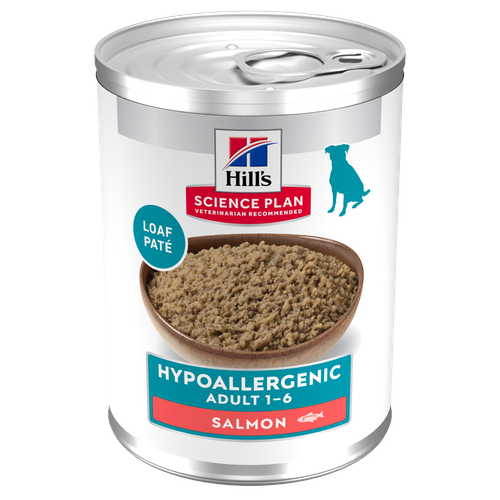
-
Find the right food for your petTake this quiz to see which food may be the best for your furry friend.Find the right food for your petTake this quiz to see which food may be the best for your furry friend.Featured products
 Adult Wet Dog Food with Beef
Adult Wet Dog Food with BeefHill's Science Plan Adult Multipack Wet Dog Food with Chicken, Beef & Turkey are complete premium pet foods for adult dogs from 1 year. Your dog will love these deliciously smooth and savoury minced loaves, formulated for balanced nutrition and overall health.
Shop Now Puppy Food
Puppy FoodHill's Science Plan Puppy Multipack Wet Dog Food with Chicken & Beef are complete premium pet foods for growing puppies from weaning until 1 year old and for pregnant and nursing dogs. Your puppy will love these deliciously smooth and savoury minced loaves, formulated for balanced nutrition and overall health.
Shop Now Mature Adult Dog Food
Mature Adult Dog FoodHill's Science Plan Mature Adult Multipack Wet Dog Food with Chicken & Beef are complete premium pet foods for mature adult dogs from 7 years. Your dog will love these deliciously smooth and savoury minced loaves, formulated to deliver the appropriate amount of energy to support the needs of adult dogs.
Shop NowFeatured products Mature Adult Wet Cat Food with Chicken
Mature Adult Wet Cat Food with Chicken
Tender chicken chunks in gravy for mature adult cats. Made with easy-to-digest ingredients, high-quality protein for lean muscle maintenance and antioxidant vitamins C+E for optimal health.
Shop Now Adult Multipack Wet Cat Food with Beef, Ocean Fish & Chicken
Adult Multipack Wet Cat Food with Beef, Ocean Fish & ChickenTender chunks in gravy for cats, with high-quality protein to maintain lean muscle. With vitamin E and omega-3s & -6s for healthy skin and balanced minerals to support healthy vital organs.
Shop Now Light Adult Multipack Wet Cat Food with Chicken & Ocean Fish
Light Adult Multipack Wet Cat Food with Chicken & Ocean FishTender chicken chunks in gravy for cats, with L-carnitine and fewer calories for ideal weight management. Packed with high-quality protein, omega-6s, and vitamin E for shiny fur and healthy skin.
Shop Now -
Dog
- Dog Tips & Articles
-
Health Category
- Weight
- Food & Environmental Sensitivities
- Urinary
- Digestive
- Joint
- Kidney
-
Life Stage
- Puppy Nutrition
- Adult Nutrition
- Senior Nutrition
Cat- Cat Tips & Articles
-
Health Category
- Weight
- Skin & Food Sensitivities
- Urinary
- Digestive
- Kidney
-
Life Stage
- Kitten Nutrition
- Adult Nutrition
Featured articles The Incredible Science Behind Your Pet's Microbiome
The Incredible Science Behind Your Pet's MicrobiomeLearn what your pet's microbiome is, how it contributes to your pet's gut and overall health, and why nutrition is important in maintaining healthy microbiomes.
Read More The Right Diet For Your Pet
The Right Diet For Your PetIn people, the right diet is very important. If you are eating the wrong way for your metabolism, activity level, age and lifestyle you could end up with health issues.
Read More Show some love with wet foods: a great choice for pets with health issues
Show some love with wet foods: a great choice for pets with health issuesShow some love with wet foods: a great choice for pets with health issues.
Read More -


Seeing blood is always worrying, whatever the circumstances. Blood in your dog’s poo is no exception. Sometimes you might see very bright red, fresh blood, but bleeding higher inside the intestines causes a darker, blacker appearance, which might go unnoticed as bleeding. There are lots of different reasons why you might see a bloody stool, and these range from fairly benign to potentially life-threatening, so it’s good to know what to do if you do see it. Let’s look at the possible common causes and then when to take action.
Common causes of blood in dog poo
- Colitis. This is an inflamed large bowel and is pretty common in dogs. Because of the inflammation and the fact your dog strains to go to the toilet, fresh blood and mucus are frequently seen. Colitis is often caused by a dietary indiscretion like raiding the bin, but can have some more serious causes too.
- Haemorrhagic diarrhoea or gastroenteritis. This can rapidly become very serious. It is caused by things like viral diseases, e.g. parvovirus, so it’s essential to keep your dog’s vaccines up to date.
- Bowel injury. Swallowing sharp objects like bones or gravel can injure the lining of the intestines and cause bleeding.
- Chronic enteropathies, such as food- or antibiotic-responsive enteropathy.
- Parasites. Try to keep your dog’s parasite control up to date as recommended by your vet.
- Cancer or intestinal polyps.
- Food allergies or intolerances.
- Poisons. Some poisons, such as rodent bait, cause bleeding throughout the body, including in the intestines.
These are some of the most common causes of blood in your dog’s poo, but when can you relax and when should you see your vet?


Tasty Tips
When to be concerned
The sight of blood in the stool is not necessarily a ‘dash straight to the vet emergency’, even though it may be shocking. For example, most cases of colitis get better on their own in a day or two. However, there are times that you should be concerned and get help as soon as you can.
- Severe diarrhoea. With or without blood, severe, watery diarrhoea can very quickly result in dehydration and loss of important minerals, especially if there is vomiting too. If there is blood loss, your dog can also become anaemic very quickly. Be sure to tell your vet if your dog isn't vaccinated because infectious diseases are a big risk to other patients in the hospital setting.
- Is your dog unwell or bright? You know your dog better than anyone. If they seem bright, happy and alert, and they’re eating and playing normally, then you can probably wait a day or two and see if things improve on their own. If, however, your dog seems lethargic, cries in pain or stops eating, then you should get to your vet.
- How long has it been? Even if your dog seems bright and well, if the blood continues for more than 48 hours, it’s best to get it investigated.
- Was there an event that started it? It may seem obvious, but always try to think back the last few days before you first see the blood. Has your dog had a bone as a treat, or stolen some food from the bin? Have you used poisons in the garden that they may have found? Ask your neighbours the same thing. Have you changed your dog’s food suddenly?
If you do decide you need to go to the vet, it’s really useful if you can take a sample of the poo with you. Your vet will want to test it for parasites, blood, infections, etc. Even photographs can be useful if you’re caught off guard and can’t get a sample.
It may be that just a few days of treatment and some highly digestible recovery food is all that’s needed. However, your vet may need to do blood tests and even imaging, such as x-rays or ultrasound, if there is a risk of foreign bodies or injury. In the case of things like IBD and possible tumours, then biopsies or surgery may be necessary.
If ever you’re concerned, ask your vet. We would always prefer to be safe than sorry.
Reviewed by Dr. Hein Meyer, DVM, PhD, Dipl-ECVIM-CA


One of our staff authors prepared this article for you
Related products

Hill's Science Plan Adult Multipack Wet Dog Food with Chicken, Beef & Turkey are complete premium pet foods for adult dogs from 1 year. Your dog will love these deliciously smooth and savoury minced loaves, formulated for balanced nutrition and overall health.

Hill's Science Plan Puppy Multipack Wet Dog Food with Chicken & Beef are complete premium pet foods for growing puppies from weaning until 1 year old and for pregnant and nursing dogs. Your puppy will love these deliciously smooth and savoury minced loaves, formulated for balanced nutrition and overall health.

Hill's Science Plan Hypoallergenic Adult Wet Dog Food with Salmon is a complete premium pet food for all adult dogs from 1 year. This savoury tinned loaf is specially formulated for dogs with delicate skin and stomachs. It features a single novel animal protein source and is grain-free.

Hill's Science Plan Mature Adult Multipack Wet Dog Food with Chicken & Beef are complete premium pet foods for mature adult dogs from 7 years. Your dog will love these deliciously smooth and savoury minced loaves, formulated to deliver the appropriate amount of energy to support the needs of adult dogs.
Related articles

Learn about the potential health risks of a raw diet for dogs and why they aren't the best option for your pup or you.

Learn effective tips for feeding a dog that's a picky eater and ensure proper nutrition for a finicky eater. Discover tips for pet parents at Hill's Pet UK.

How, when and what to feed your new puppy is an important decision, learn more about the things to consider for feeding your puppy.

Many human foods are dangerous to dogs. Read about 5 of the worst toxic food offenders that can kill your dog - and how much it takes to hurt them.

Put your dog on a diet without them knowing
Our low calorie formula helps you control your dog's weight. It's packed with high-quality protein for building lean muscles, and made with purposeful ingredients for a flavourful, nutritious meal. Clinically proven antioxidants, Vitamin C+E, help promote a healthy immune system.
Put your dog on a diet without them knowing
Our low calorie formula helps you control your dog's weight. It's packed with high-quality protein for building lean muscles, and made with purposeful ingredients for a flavourful, nutritious meal. Clinically proven antioxidants, Vitamin C+E, help promote a healthy immune system.

